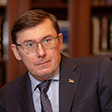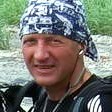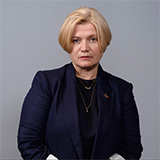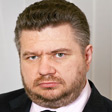Правда о 102 округе в The New York Times и Le Monde
События в 102 округе – это плевок в лицо не только 150 тысячам избирателей, которых киевские политики продали, но и всей стране. Мы можем сколь угодно долго рассказывать миру о реформах, об очищении, о новой волне политиков. Мы можем это делать даже на хорошем английском, срываясь на крик. Уродливая правда будет сидеть в зале Верховной рады, цинично улыбаться и рассказывать о честных выборах.
Parliamentary elections show political turmoil is continuing in Ukraine
By David Herszenhorn, NEW YORK TIMES
October 25, 2014
SVITLOVODSK, Ukraine – As two of Ukraine's best-known investigative journalists, Sergii Leshchenko and Mustafa Nayyem showed a boundless zeal for exposing corruption and hypocrisy at the highest levels of government. So it set heads spinning within the country's political and media elite last month when they suddenly announced that they were not only jumping the fence to run for Parliament, but also joining the establishment as candidates of President O. Poroshenko's coalition party.
Or at least that's how it seemed. In a sign of how hard it can be to kick old habits, Mr. Leshchenko and Mr. Nayyem have spent the final week of the campaign not working to promote themselves, but rather crusading to defeat a candidate supported by their own party – a former official in the Kiev city government, whose front-runner status in this rural district 250 miles south of the capital, they say, was the result of corrupt back-room dealing approved by someone close to Mr. Poroshenko, if not by the president himself.
"We want to demonstrate to society and to our political party at the same time that we are not going to tolerate this corrupt conspiracy," Mr. Leshchenko said, sitting in the passenger seat of a white S.U.V. with a large red decal that said "Stop Corrupt Politicians" plastered on its front hood. Sounding genuinely torn, he added, "The most difficult part for us to accept was that we were going to fight against Poroshenko."
That such infighting would start so fast and so furiously – even before Sunday's vote – offers a glimpse of just how tumultuous politics remain in Ukraine eight months after the ouster of President Viktor F. Yanukovych, with a war against pro-Russian separatists still simmering in the east, hundreds of thousands of people displaced from their homes, Crimea annexed by Russia and an economy ever on the brink of collapse.
For many supporters of the street protests that toppled Mr. Yanukovych, the elections were envisioned as a final step in transforming the government from an opaque kleptocracy beholden to the president, his oligarch backers and the Kremlin, to a transparent, reform-minded, pro-Western administration with a Parliament accountable to the people. The elections are also crucial to the United States and its European allies, which have staked enormous political and financial capital on Ukraine's future.
Events here, however, suggest that transformation may take a lot longer.
Ukrainian politics have long been dominated by big business interests, mainly the industrial titans known as oligarchs, who finance the campaigns of parties and candidates in exchange for influence within the presidential administration and for control of some seats in Parliament, called the Verkhovna Rada. The protests centered in Independence Square, known as Maidan, have not changed that – at least not yet.
"The voting system is the same as it was two years ago," Mr. Leshchenko said. "Oligarchs in Ukraine did not give up after Maidan. They are still very influential players."
The ballot on Sunday includes fresh options, and the Parliament to be formed later this year is expected to reflect that. There is a new party called Self-Help, led by Andriy Sadovyi, the mayor of Lviv, the biggest city in western Ukraine, and Hanna Hopko, a young civic activist.
Some previously obscure parties – like the populist Radical Party, led by a flamboyant lawmaker, Oleh Lyashko, and Civil Position, led by a former defense minister, Anatoly Hrytsenko – also have a chance of crossing the 5 percent threshold for forming a faction in Parliament.
And there is an array of first-time, reform-minded candidates who had never intended on joining organized politics before the uprising last winter. Those include Mr. Leshchenko and Mr. Nayyem, who worked for the online news site Ukrainska Pravda, and Svitlana Zalishchuk, a television reporter who left journalism for civic activism before the protests started last fall and more recently led a coalition of government-reform groups pressing Parliament to make legislative changes.
Half of the Parliament's 450 seats are filled by candidates from party lists, with the seats awarded proportionally based on the results of voting nationwide, while the other half are filled by direct election of candidates who run in individual districts, either with or without party endorsement. Independent candidates can choose later if they want to affiliate with a party, potentially winning more influence if they join the majority.
The fight here in the central Kirovohrad region, on the west bank of the Dnieper River, is focused on a candidate named Oles Dovhyi, who was a former secretary of the Kiev City Council. His critics say he was responsible for a series of corrupt deals involving the sale of municipal land.
Mr. Dovhyi tried to win a seat in Parliament from Kiev in 2012 but failed in part because the allegations against him were well known by city voters. Mr. Leshchenko and Mr. Nayyem said that friends of Mr. Dovhyi who are close to Mr. Poroshenko apparently cut a deal to let him run here in the Kirovohrad region, where his ancestors once lived.
The critics of Mr. Dovhyi said they believed he was eager to join Parliament because he would then have immunity from prosecution, including any charges from an investigation into allegations first put forward in 2010 that he used his position to obtain ownership, together with business partners, of prime real estate near Kiev's landmark St. Sofia Cathedral.
Mr. Leshchenko recounted details of the transactions in a recent blog post on Ukrainska Pravda. Mr. Dovhyi, who has denied wrongdoing in the past, did not return phone messages left for him on Saturday.
In a last-ditch effort, Mr. Leshchenko, Mr. Nayyem and Ms. Zalishchuk deployed in force, hoping to tilt the election in favor of a local candidate named Andriy Lavrus. They expect to lose. Local residents said that supporters of Mr. Dovhyi have been buying votes for 200 hryvnias each, or about $15.
At a rally here in Svitlovodsk on Thursday evening, the candidates from Kiev were joined by some local activists who urged voters to support Mr. Lavrus. "Before, we used to change old socks for old socks," Natalia Tashkevych, who coordinated antigovernment protests here last winter, told a crowd of perhaps 50 people. "Now it's time to put on new socks!"
Corruption is the main but hardly the only challenge in the Ukrainian elections. The government has acknowledged that voting will be impossible throughout much of the embattled regions of Luhansk and Donetsk, which still remain partly under the control of pro-Russian separatists, as well as in Crimea, which Russia annexed in March. International observers expect as much as 10 percent of Ukrainian voters to be unable to participate.
In a statement on Saturday, Mr. Poroshenko said the early parliamentary vote represented his fulfillment of a major campaign promise.
"It's time to complete a full reset of power," he said, adding, "I have enough political will to implement the developed strategy of reforms. But I also need the majority in the Parliament. Reformist majority, not corrupt one. Pro-Ukrainian and pro-European, not pro-Soviet."
While voter surveys have shown Mr. Poroshenko's bloc running at the head of the pack, the party is not expected to win a controlling majority and will have to form a coalition with one or more minority factions.
Also jockeying for representation in the Parliament are two parties that include members of Mr. Yanukovych's Party of Regions, which held the majority until he fled Ukraine: the Opposition Block and Strong Ukraine. And there are two parties that include a number of establishment politicians: Fatherland, led by the former prime minister Yulia V. Tymoshenko, and People's Front, led by the current prime minister, Arseniy P. Yatsenyuk.
Because of their place on the Poroshenko party list, Mr. Leshchenko, Mr. Nayyem and Ms. Zalishchuk are virtually assured of being elected. They acknowledged that relations could prove difficult not only with Mr. Dovhyi, if he wins, but also with the longer-serving politicians they once covered as journalists. They said an early goal would be an overhaul of election laws.
"We would like to destroy the old political establishment from inside, the rules of the old political elite," Mr. Leshchenko said. "If we don't do this, who is going to do it?" He said he did not blame Mr. Poroshenko, who made a fortune in candy manufacturing, for the back-room deal, but would hold him responsible.
"Just because his name is on the top of the party, it is not his private property," Mr. Leshchenko said. "The party is not a confectionary. The party is an institution, which reflects society. I'm grateful to Poroshenko because he created this internal competition."
Political organizations are prone to corruption, he said, and the former journalists could help reverse that trend. "In this sense, Poroshenko needs us to control this from inside," he said. "Now Poroshenko has us. He can say, 'Nothing personal, but these young journalists in my party will not tolerate this. I cannot accept this because it will destroy my party.' "
For the first time in a long conversation, Mr. Leshchenko smiled. "I like this role."
De Maïdan à la dure école de la politique
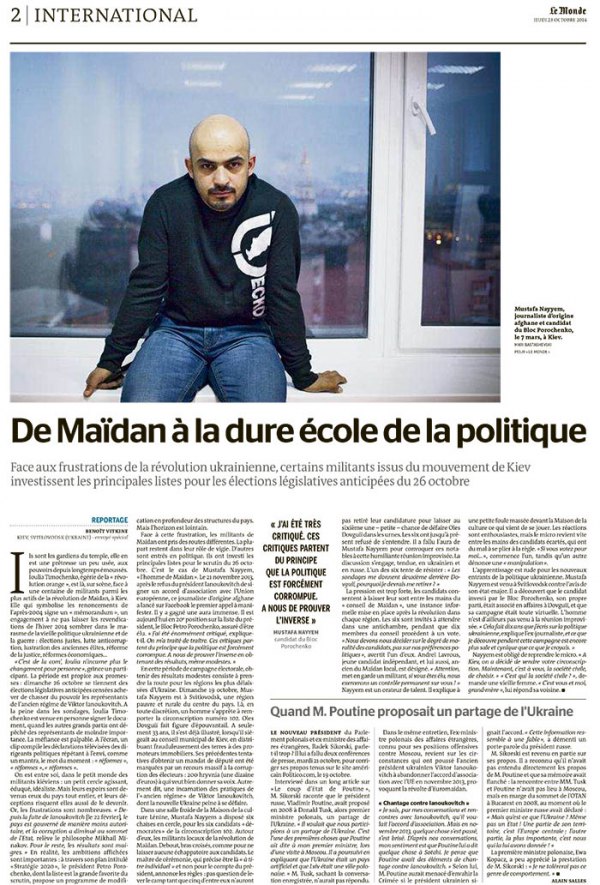
Блог автора – матеріал, який відображає винятково точку зору автора. Текст блогу не претендує на об'єктивність та всебічність висвітлення теми, яка у ньому піднімається. Редакція "Української правди" не відповідає за достовірність та тлумачення наведеної інформації і виконує винятково роль носія. Точка зору редакції УП може не збігатися з точкою зору автора блогу.


